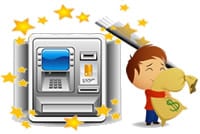The holidays are coming! The holidays are coming! Guard your budgets and hold onto your wallets. You might be thinking I’m crazy, but the retailers have positioned their holiday displays to disarm you of your cash.
Now is the time to remember how you felt last year when you overspent.
Can you make this year different? Can you stick to your list and not overspend? You can if you make a detailed plan. Write down exactly what you will be buying and the dollar amount you plan to spend.
Here are some suggestions that should help you with your holiday budget list.
1. Gifts
- How much for immediate family?
- How much for extended family?
- How much for friends and co-workers?
- How much for people whose services you use?
2. Entertaining
- How much will it cost when you host a gathering?
- How much will you spend on hostess gifts when you attend a party?
3. Travel
- How much will it cost for local travel (gas, tolls, parking, etc)?
- How much will it cost for long distance travel?
- How much will it cost for vacation?
4. Traditions – this can be anything from an afternoon tea to a night on the town.
If you write it all down, you might realize you’re planning on spending $300-$500 on gifts for people who aren’t on your immediate family list. And hosting dinners can be expensive just because you want to put on a good appearance. Ever notice a big stain on the tablecloth and found yourself running to the store at the last minute to buy one full price?
Holiday fun can wreak havoc on your budget, but it doesn’t have to. Now is the time to get a jump start on planning, and to put away money for the details that are important to you. Think of it as your own layaway plan. Take money out of each check, in addition to your regular savings deduction, to create your own holiday fund.
Doing this now will make January 2013 less stressful.






 Hello everyone! This is your quarterly reminder from me.
Hello everyone! This is your quarterly reminder from me.



